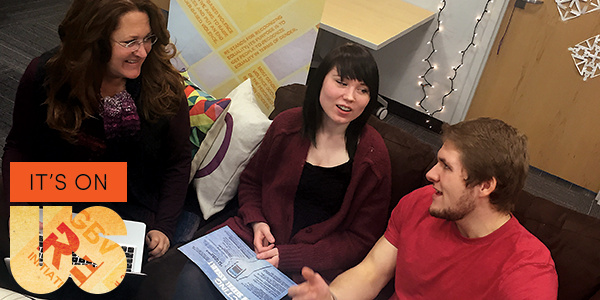
WSU now offers a peer-staffed 24/7 confidential helpline (507-457-5610) to assist any WSU or Southeast Tech student, faculty member, or staff with any aspect of GBV.
More than a decade has passed since Tamara Berg, Professor and Director of the Women’s, Gender, and Sexuality Studies Program, began her work on gender-based violence issues.
Berg has served on many boards, including the Women’s Resource Center of Winona (WRC), and she has taught many courses on gender violence and child advocacy. And that is only the beginning of one individual’s drive and determination to
rally a community to address the very real effects of gender-based violence in this quietly beautiful Upper Mississippi town and University campus.
The community took notice of Berg in a big way: WSU Student Senate
Faculty of the Year Award, 2005; Sister Pat Kowalski Leadership Award from Minnesota Campus Compact, which recognizes individuals who demonstrate
a commitment to high-quality service-learning and campus-community collaboration, 2009; Safer Community Award given by the Women’s Resource Center of Winona, 2013. But awards and recognition aren’t what motivate Berg.
Gender-based violence (GBV). The term sounds a bit vague, but it encompasses a range of hostile and violent behaviors that are all too real. GBV brutalizes individuals and the community as a whole.
A year ago, the White House released Not Alone, a report of the Task Force to Protect Students from Sexual Assault, which noted that, “One in five women is sexually assaulted in college. Most often, it’s by someone she knows—and also most often, she does not report what happened. Many survivors are left feeling isolated, ashamed, or to blame. Although it happens less often, men, too, are victims of these crimes.”
WSU has made a commitment to take these statistics seriously. Berg, and the numerous partners and organizations she enlisted to help, decided to tackle the problem directly. “The challenge at WSU is one that plagues colleges and universities nationwide,” Berg explained. “GBV is prevalent, pervasive, and under-reported.”
In the spring of 2013, members of WSU’s All University Sexual Violence Advisory Committee, which Berg co- chairs with Connie Kamara, Director of Student Health Services, applied for one of the very competitive campus grants offered by the Department of Justice. It was an all-out community effort.
Berg brought together Diana Miller, Director of the Winona Women’s Resource Center; Kalene Engel, a community lawyer; Stephanie Nuttall, Assistant Winona County Attorney; Karin Sonneman, Winona County Attorney; the Winona Police Department; and WSU departments, including Student Life, Legal Affairs, Health and Wellness, Security, Housing, and Grants & Sponsored Projects, to collaborate on the project and confront the issue of GBV head-on.
“We were very excited to hear in September 2013 that we were one of only 28 of the universities in the country to be awarded the Department of Justice grant,” said Berg. (127 universities applied.) An Integrated Approach to Addressing Gender-Based Violence at WSU is a prestigious three-year $293,859 grant, renewable for up to six additional years. The grant will expand and reorganize WSU initiatives
to reduce sexual assault, domestic violence, dating violence, and stalking on campus. And the grant will succeed in bringing WSU into compliance with the Federal Clery Act’s mandates for college campuses.
With the support of this grant, WSU has begun to institutionalize a comprehensive set of programs
that will serve to educate all members of the campus community regarding GBV. An emphasis on prevention, bystander intervention education, and engaging men is central to the initiative.
“The grant specifically funds the infrastructure to deliver a comprehensive peer advocacy and education program,” Berg said. “We have worked primarily on these initiatives, as well as on forming a Coordinated Community Response Team.”
In addition, systems are being put in place to improve and establish systematic tracking of student attitudes toward violence through surveys and responses to university-sponsored classes and programs designed to decrease violence.
GVB Statistics
- 1 in 5 women and 1 in 16 men are sexually assaulted in college
- 40% of survivors fear reprisal by the attacker
- Only 2% of incapacitated rape survivors report assault
- Only 13% of rape survivors report assualt
- 8 in 10 victims knew their attacker (friend, significant other, etc.)
- It is estimated that 2%-7% of sexual assault reports are false
Source: ITSONUS.org
The focus of the grant is to educate students, faculty, staff, and administrators on the WSU-Winona campus on issues of GBV. The overall goals are a safer campus community, support for survivors of violence, accountability for perpetrators, and comprehensive education on prevention, bystander intervention, access to campus and community services, and victim’s rights. Emphasis is placed on developing innovative, culturally-specific prevention and intervention strategies that meet the needs of LGBTQ and international students.
Berg continued, “Working closely with the WRC, WSU now offers a peer-staffed 24/7 confidential helpline (507-457- 5610) to assist any WSU or SoutheastTech student, faculty member, or staff with any aspect of GBV.
Since receiving the grant, WSU has hired and trained 15 students as peer educators and advocates. The university has also adapted a bystander intervention education program from Duke University called PACT (Prevent. Act. Challenge. Teach.) that provides students with the skills necessary to safely and effectively stand up and say, “Violence is NOT okay.” More than 2,000 students have been directly affected by the PACT program thus far.
The impact of Berg’s efforts and those of her partners in the program are far-reaching.
“This grant is a powerful example of what we can achieve through collaboration and mutual commitment to making our campus and community a safer place.”
The perfect example of working together to achieve the common goal of a safer community for all.
The Pledge
To RECOGNIZE that non- consensual sex is sexual assault.
To IDENTIFY situations in which sexual assault may occur.
To INTERVENE in situations where consent has not or cannot be given.
To CREATE an environment in which sexual assault is unacceptable and survivors are supported.
Tech student, faculty member, or staff with any aspect of GBV.”

